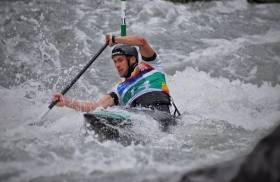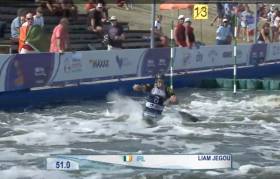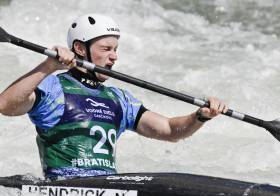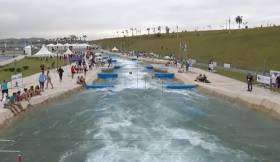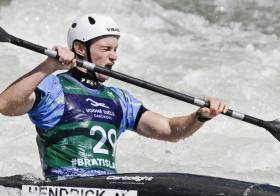Displaying items by tag: canoe slalom
2022 is going to be a big year for Canoe Slalom, with a combination of a packed international calendar of racing and a particularly strong Irish Team setting the stage for a great year ahead. This busy season got underway at the European Championships, held in Slovakia from the 26th-29th May. For the slalom team, this was the first opportunity post team selection for the whole squad to line up and put down some pace markers for the season.
Day 1 of racing focussed on the K1s. A fast course set for the race turned the dial up for the entire field, with some extremely quick times being put down with some extremely fine margins making qualification a very competitive affair. Madison Corcoran was the first athlete lining up for the Irish Team in these championships, finishing the event in 28th position. At only 19 years of age Madison’s performance is a great portent of things to come. The K1 Men team were hoping to follow up on what was a very strong 2021 season and showed some excellent pace throughout the event.
Noel Hendrick was the top finisher, coming home in 32nd place, narrowly missing the semi-final with 2 gate penalties incurred. Alistair McCreery was the next best in 38th place, with some very consistent racing across the qualification rounds. Samuel Curtis was the final Irish athlete in 42nd, being dropped lower in the results with penalty seconds. Back racing in the afternoon these athletes teamed up to finish 17th in the K1 men's team race.
The Friday was the chance of the C1s to get out and kick off their 2022 campaigns.
In the C1 Women Michaela Corcoran exactly replicated her twin sisters performance, finishing in 28th. The always strong C1 Men were next up and proceeded to continue their excellent run of racing. Liam Jegou and Jake Cochrane both qualified through to Sunday's semi-finals, with Robert Hendrick showing great pace throughout the race, being hampered by time penalties. The C1 men again lined up together to show us their team racing pedigree, putting down a solid race to end the day with 7th in the team race.
In the C1 Men semi-final, the tough course set for the next round of racing proved a significant challenge for the entire field, with Liam Jegou and Jake Cochrane proving no exception. Both did themselves justice on what was a tight day of racing, showing great composure and grit through the pressurised race. Liam finished up in 16th position, with Jake landing in 19th, moved lower with 4 penalty seconds.
Cochrane and Teague Qualify for Semis of World Cup Final
#Canoeing: Jake Cochrane and Eoin Teague made it through to the semi-finals at the canoe slalom World Cup Final in Prague. Teague, in the K1, and Cochrane in the C1, both qualified from their second runs. Liam Jegou did not in the semi-finals of the men’s C1. He came close in the first run and had three touches, incurring six seconds in penalties, in his second.
#Canoeing: Noel Hendrick put in a solid performance in the men’s K1 semi-final at the canoe slalom World Under-23 Championships in Krakow, Poland, this morning. He had no touches, but his time of 91.46 seconds left him outside the top 10 who went through to the final. He finished 22nd.
Eoin Teague was off the pace in his run and was then thrown completely out of the reckoning at the finish when he misjudged gate 20 and was given a 50-second penalty.
Canoe Slalom World Under-23 Championships, Krakow (Irish interest)
K1 Semi-Final: 22 N Hendrick 91.46 seconds; 36 E Teague 144.24
#Canoeing: Liam Jegou eased into the final of the men’s C1 at the canoe slalom World Championships this morning. The Ireland paddler delivered a fault-free semi-final in 93.79 seconds to place fourth of the 10 finalists.
Canoe Slalom Under-23 World Championships, Krakow (Irish interest)
Men, C1 Semi-Final: 4 L Jegou 93.79
McClure and Hendrick Best of Irish in Spain and Slovakia
#Canoeing: David McClure finished fifth in the final of the K1 Surface event at the canoe freestyle World Championships in Sort in Spain. At the canoe slalom European Under-23 Championships, Noel Hendrick reached the semi-finals and finished 26th in Liptovsky Mikulas in Slovakia. The Irishman had touches on gates three and 17, incurring four seconds in penalties.
Liam Jegou Wins at Canoe Slalom Irish Open
#Canoeing: Liam Jegou, Sam Curtis and Aisling Conlan all had wins at the canoe slalom Irish Open at the Sluice Weir in Lucan today. Jegou, who travelled from his base in Pau in France for the event, was the top C1 paddler, while Curtis and Conlan won their K1 events. The Ireland selection event for the season will be held at La Seu d’Urgell in Spain next month.
Canoe Slalom Irish Open, Dublin, Sunday (Selected Results; results on best of two runs)
Men
K1: Sam Curtis 79.87 seconds. Junior: Adam Vaugh 93.82.
C1: Liam Jegou 81.76
Women
K1: Aisling Conlan 103.20.
Jegou Takes His Bow in World Championship Semi-Final
#Canoeing: Ireland’s Liam Jegou finished 24th in the semi-final of the canoe slalom World Championships in Rio de Janeiro. The C1 paddler incurred four seconds of penalties for touches on gate one and gate 10 which cost him his chance of making the top 10 and Saturday’s final.
Canoe Slalom World Championships, Rio de Janeiro: C1 Semi-Final (First 10 to A Final): 24 Ireland (L Jegou) 110.04 seconds.
Hendrick and Jegou on Song in Slovakia
#Canoeing: Noel Hendrick qualified for his first semi-final in a big event and went on to make the final at the canoe slalom European Under-23 Championships in Bratislava. The Irishman finished ninth. It was a breaktrough for the young K1 paddler.
Liam Jegou also made it through the C1 semi-finals on Sunday.
Jegou Bows Out in European Semi-Finals
#Canoeing: Liam Jegou finished 17th in the under-23 C1 semi-final at the European Junior and Under-23 Championships in Hohenlimburg, Germany today.
The France-based competitor incurred a two-point penalty on the first gate, and while he did not touch or miss another gate his time put him three seconds outside the top 10, who qualified for the final.
Jegou Ranked in Top Twenty Canoeists after World Cup Final
#Canoeing: Liam Jegou finished 14th at the canoe slalom World Cup Final in Tacen in Slovenia. The 20-year-old was less than a second from qualification from the semi-final. The course underwent major changes after building work failed: the number of gates was limited to 14. Jegou emerged with a season ranking in the World Cup events of 17th of the 103 competitors. He is in his first season on the circuit as a senior paddler.
Canoe Slalom World Cup Final, Tacen Slovenia (Irish interest)
Men
C1 Semi-Final: 14th - L Jegou 110.9 seconds.



























